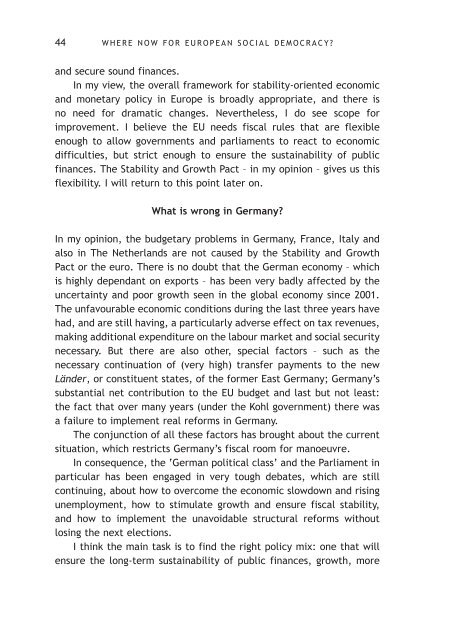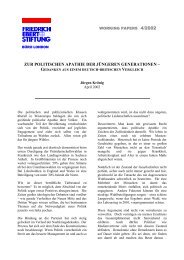Where Now for European Social Democracy? - Policy Network
Where Now for European Social Democracy? - Policy Network
Where Now for European Social Democracy? - Policy Network
You also want an ePaper? Increase the reach of your titles
YUMPU automatically turns print PDFs into web optimized ePapers that Google loves.
44WHERE NOW FOR EUROPEAN SOCIAL DEMOCRACY?and secure sound finances.In my view, the overall framework <strong>for</strong> stability-oriented economicand monetary policy in Europe is broadly appropriate, and there isno need <strong>for</strong> dramatic changes. Nevertheless, I do see scope <strong>for</strong>improvement. I believe the EU needs fiscal rules that are flexibleenough to allow governments and parliaments to react to economicdifficulties, but strict enough to ensure the sustainability of publicfinances. The Stability and Growth Pact – in my opinion – gives us thisflexibility. I will return to this point later on.What is wrong in Germany?In my opinion, the budgetary problems in Germany, France, Italy andalso in The Netherlands are not caused by the Stability and GrowthPact or the euro. There is no doubt that the German economy – whichis highly dependant on exports – has been very badly affected by theuncertainty and poor growth seen in the global economy since 2001.The unfavourable economic conditions during the last three years havehad, and are still having, a particularly adverse effect on tax revenues,making additional expenditure on the labour market and social securitynecessary. But there are also other, special factors – such as thenecessary continuation of (very high) transfer payments to the newLänder, or constituent states, of the <strong>for</strong>mer East Germany; Germany’ssubstantial net contribution to the EU budget and last but not least:the fact that over many years (under the Kohl government) there wasa failure to implement real re<strong>for</strong>ms in Germany.The conjunction of all these factors has brought about the currentsituation, which restricts Germany’s fiscal room <strong>for</strong> manoeuvre.In consequence, the ‘German political class’ and the Parliament inparticular has been engaged in very tough debates, which are stillcontinuing, about how to overcome the economic slowdown and risingunemployment, how to stimulate growth and ensure fiscal stability,and how to implement the unavoidable structural re<strong>for</strong>ms withoutlosing the next elections.I think the main task is to find the right policy mix: one that willensure the long-term sustainability of public finances, growth, more



